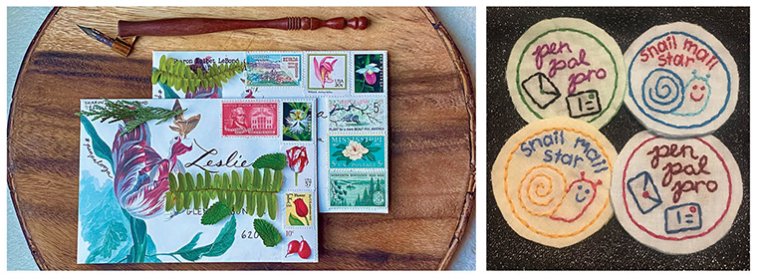Nupur Chaudhury, a public health strategist living in New York City, grew up in the nineties sending letters through the mail. She received weekly aerograms from relatives in India; she corresponded with a pen pal in Texas; her father even took her to admire the post office’s new stamps every month. But as she grew older, Chaudhury says, “E-mail became more popular, and I really put that writing part of me to the side”—that is, until she came across the pen pal exchange Penpalooza on Twitter in August 2020.

Vintage stamps and calligraphy adorn a letter from Sharon Kolbet LeBond to a Penpalooza pen pal (left); Ali Abel hand-stitched pen pal achievement badges to celebrate her correspondence. (Credit: Letters: Sharon Kolbet LeBond)
At the time, Penpalooza was less than two months old and swiftly growing, thanks to the inventiveness and charm of its founder, New Yorker staff writer Rachel Syme, and to an evident need for social outlets during the COVID-19 pandemic. Syme, who lives in New York City, began mailing letters to friends and family in April 2020, when, she told Pop-Up Magazine, she rarely left her apartment and “couldn’t write for more than a few minutes at a time.” Writing letters, she said, helped jump-start her work. In late June, Syme asked her Twitter followers—they currently number more than 111,000—if anyone would be interested in finding a pen pal. In a matter of days she received more than five hundred replies, and on June 30, she launched Penpalooza on Elfster, an online platform designed to facilitate Secret Santa gift exchanges. By July 9 more than 1,500 people had signed up. By the time 2020 came to a close, nine thousand pen pals had found correspondents from more than fifty countries. Penpalooza is the largest exchange ever hosted on Elfster, so large that the platform’s engineers altered their code specifically to accommodate this demand.
Through Penpalooza, Chaudhury has connected with numerous pen pals, one of whom lives twenty minutes from her; others live in Washington, D.C., Los Angeles, Toronto, Dublin, London, and Vancouver, British Columbia. In their correspondence she has read about job losses, relationships, kids, and daily life. Her pen pals have also mailed recipes, crossword puzzles, pictures of family dogs, and even a pair of warm socks. For Chaudhury, whose pre-pandemic work required meeting new people every day, the exchange has offered “something unexpected and whimsical in this stretch of time that’s been so monotonous, so depressing, and so hard.” She says, “To wake up every morning and think to myself, ‘Who shall I write to today?’ and, ‘Is today the day that I’ll get a response?’ is utterly fantastic.”
Like Syme herself, some of those who have come to Penpalooza are also working writers. Kristin Keane—the author of the fiction chapbook Luminaries, which is forthcoming from Omnidawn in April—joined the program in September. Her father was a mail carrier for thirty years, and she sees letter-writing as “sacrosanct.” And while some thriving Penpalooza exchanges take place over e-mail for accessibility reasons, for Keane and many others, a physical letter is “a little boomerang of hope.” Keane says, “Understanding that someone else is thinking of you and taking the time to put their hand down to real paper and tell you that matters a lot right now.”
Syme describes mail in similar terms, like “a message in a bottle”—handmade, well-traveled, the result of “so many miracles that have to happen for it to arrive on your doorstep.” And many of these miracles have found a second home on Twitter, as senders and recipients alike share the process and products of their “mail art.” A scroll through #penpalooza reveals shots of beautiful handmade envelopes—addresses obscured, of course—held in front of mailboxes, of delicate embroidery, of stationery collections and favorite stamps and even gift baskets. Many participants, Chaudhury included, have found additional pen pals on Twitter, rushing to adopt strangers whose initial letters were never answered.
Since Syme embarked on Penpalooza, letters have become another part of her writing life. “It’s a different part of my brain,” she says, “and it’s a different part of my creative tool kit, and I really love it.” She isn’t alone: Many people have told her that participating in Penpalooza has “opened up long-dormant desires to communicate this way, to be creative,” she says. As of this writing, Penpalooza remains open to new participants; Syme doesn’t know what the demand will be for the exchange once “our sense of isolation has receded,” whenever that may be, but she plans to keep Penpalooza alive as long as it’s wanted. Maybe, she says, it’ll even become “an alternative to your big, outside partying world—maybe you’ll then come back in and write letters.”
Emma Hine is the author of Stay Safe, which received the Kathryn A. Morton Prize and was recently published by Sarabande Books. Her poems and essays have appeared in Copper Nickel, Gulf Coast, the Offing, the Paris Review, the Southern Review, and elsewhere.








